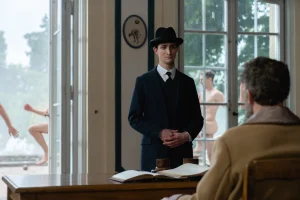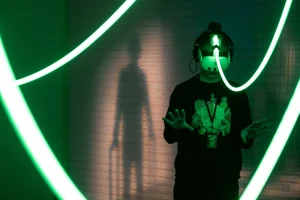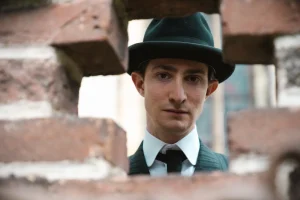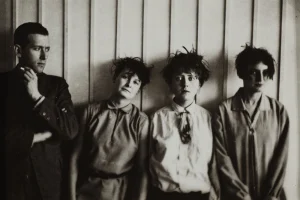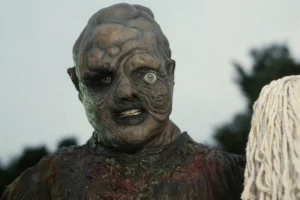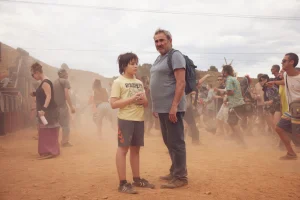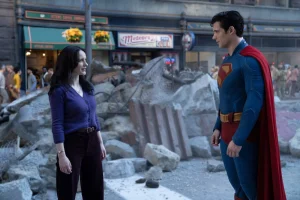A young college professor processes a traumatic event as best as she can over multiple years in Sorry, Baby, which debuted at Sundance before screening at this year’s Karlovy Vary International Film Festival and opens in Prague cinemas this weekend courtesy distributor Aerofilms. This diverting black comedy is cut from the same cloth as early films from Greta Gerwig and Noah Baumbach, and serves as an career-launching showcase for debut writer-director and star Eva Victor.
Sorry, Baby opens with a reunion of sorts at the rural home of Agnes (Victor) by the unnamed New England liberal arts college where she teaches. Her old bestie Lydie (Naomi Ackie) joins her ahead of dinner with Natasha (a scene-stealing Kelly McCormack), and two other friends, who studied with them at the same college. But an off-the-cuff remark by Natasha—irked by Agnes’ recent promotion—hints at the trauma that Agnes continues to deal with, largely by herself.
Years back, when they were graduate students, Agnes was the recipient of effusive praise from literature professor Preston Decker (Louis Cancelmi), who Lydie suggests is romantically interested in her. Agnes dismisses the notion, but later meets Decker at his home; in Sorry, Baby‘s most haunting scene, the camera holds on a single exterior shot of the house as day becomes night, and as Agnes leaves and silently drives home. The film doesn’t tell us anything, but we know exactly what has transpired.
While roommate Lydie offers Agnes some human consolation, everyone else she approaches about her assault is distressingly matter-of-fact. A doctor discusses protocol and what she should have done, college officials tell her that since Decker immediately resigned following the assault, there’s nothing they can do—but because they are women, they understand.
Instead of approaching these reactions with anger, Victor—both as writer-director and star—approaches them with inquisitive humor, a kind of Kafka lost in the bureaucracy of #MeToo. In the effort to handle these situations in the “correct” manner, we have somehow lost the ability to handle them in a human one.
Victor manages an impressive balance throughout the duration of Sorry, Baby, using a light touch to confront difficult thematic material. There are a number of laugh-out-loud moments throughout the movie that subtly nod to an underlying pain and anguish, a deep-seated trauma that lives with us for years, and colors how we interact with the world.
The structure of Sorry, Baby spans a number of years—each segment comes with its own “The year with the…” title card—and multiple vignettes centered around Agnes and other characters who sometimes only appear for a single scene. But that stark inciting incident hangs over every interaction: Agnes will sometimes need to confront her past trauma—including in a memorable jury selection sequence—but even in lighter moments it’s still lurking in the background.
Even as Agnes apologizes to a baby for the future pain she will endure in life, Sorry, Baby doesn’t lose sight of small kindnesses that exist around us. John Carroll Lynch has a memorable scene as a surly sandwich shop operator with his own problems who helps Agnes come down from a panic attack; Lucas Hedges is a benevolent neighbor that she warily begins a relationship with.
The blend of weighty themes and understated humor in Sorry, Baby is enriched by Lia Ouyang Rusli’s wistful, melancholic score, which wraps the story in a strangely nostalgic haze. Mia Cioffi Henry’s stark autumn cinematography deepens that mood, framing each moment with a quiet, lingering beauty. Together, they capture the all-too-familiar rhythms of life—its light and its shadows, existing side by side.
Sorry, Baby is a quietly moving debut that finds humor in heartbreak and poignancy in the everyday. Victor delivers a multi-faceted turn as writer, director, and star, crafting a story that lingers like a memory you can’t shake. With laugh-out-loud moments that cut to the bone and a haunting restraint that speaks volumes, the film transforms personal trauma into an empathetic portrait of survival, resilience, and the messy grace of moving forward.





